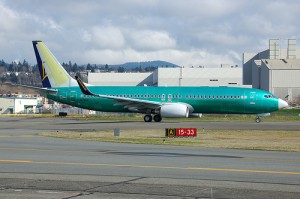Ryanair Might Stop Growth Due to No Planes
Ryanair has over 200 Boeing 737-800’s, which allows them to save on maintenance, training, parts, etc. However, this also lessens their ability to negotiate effectively if Boeing knows Ryanair is not likely to start buying other aircraft types.
Ryanair is one of Europe’s biggest airlines and they feel they can keep growing. They are so confident about their ability to grow, they are looking to purchase another 200 airplanes and they say Boeing is not working hard enough to make a good deal.
“We see no point in continuing to grow rapidly in a declining yield environment, where our main aircraft partner is unwilling to play its part in our cost reduction programme,” Michael O’Leary, the famous CEO for Ryanair, said about the situation.
O’Leary says they have cash on hand and if Boeing doesn’t want it, they will just pay their stockholders in dividends instead (why not put the money to providing some actual customer service? Nah’¦).
This seems it might just be O’Leary doing what he does, trying to squeeze every last dime out of Boeing. I find it hard to believe that Ryanair would move to having two aircraft types or willing to shell out the money to convert their entire fleet into one. My bet is either they really don’t want to buy 200 planes or if they do, they will all be Boeing 737’s.

Take a look at the winglet and tail. This is a new Boeing 737-800 for Ryanair.
Ryanair has over 200 Boeing 737-800’s, which allows them to save on maintenance, training, parts, etc. However, this also lessens their ability to negotiate effectively if Boeing knows Ryanair is not likely to buy other aircraft types.
The airline is one of Europe’s biggest and they feel they can easily keep growing. They are so confident about their ability to grow, they are looking to purchase another 200 airplanes, but they say Boeing is not working hard enough to make a deal.
“We see no point in continuing to grow rapidly in a declining yield environment, where our main aircraft partner is unwilling to play its part in our cost reduction programme,” Michael O’Leary, the famous CEO for Ryanair, said about the situation.
O’Leary says they have cash on hand and if Boeing doesn’t want it, they will just pay their stockholders in dividends instead (why not put the money to providing some actual customer service? Nah’¦).
This seems it might just be O’Leary doing what he does, trying to squeeze every last dime out of Boeing. I find it hard to believe that Ryanair would move to having two aircraft types or willing to shell out the money to convert their entire fleet into one. My bet is either they really don’t want to buy 200 planes or if they do, they will all be Boeing 737’s.
follow via | web | twitter | email | rss |
Source: Airwise Image: drewski2112
EDITOR-IN-CHIEF & FOUNDER - SEATTLE, WA. David has written, consulted, and presented on multiple topics relating to airlines and travel since 2008. He has been quoted and written for a number of news organizations, including BBC, CNN, NBC News, Bloomberg, and others. He is passionate about sharing the complexities, the benefits, and the fun stuff of the airline business. Email me: david@airlinereporter.com
https://www.airlinereporter.com
Eliminate Your Flying Fear with an iPhone App
Airline Livery of the Week: Albanian Airlines

You make their argument right in the post, Boeing knows they have them. Looks like Ryanair is making the right call by trying to squeeze them for lower prices. While I have never flown Ryanair I can tell from your posts you don’t think they do a great customer service wise that is why they have to get Boeing to lower prices so they can keep pices down. It sounds like they are kind of the Wal Mart of the airlines. Lower service but lower prices thru pressure on their suppliers. Do people agree with this model or not? Only time will tell but like Wal Mart even if you dont shop there or fly Ryanair you benefit from their strategies because of market competion you pay lower prices at the airlines you do fly.
i have flown ryanair a few times and found their service to be just ok, standard. not all that good, but not horrendous either. do we agree with that model? today in an industry that competes pretty much just on price, i think its quite obvious